National Stress Awareness Month
We all have stress at one time or another, but have you ever considered what too much stress can do to your body? Make no mistake, stress is real! It can affect our bodies in many ways.
How Stress Affects our Body!
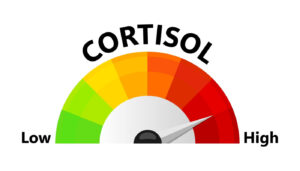
Everyone has probably heard of the term, “Cortisol”. When are our cortisol levels at their highest level? Cortisol levels peak between 7 to 8 am in the morning, and are the lowest between 2-4 am. (Just as an aside, it would be interesting to know if they have done any studies on the cortisol levels of those people who work the midnight shift. Interesting, yes?)
When we feel stressed, our body makes some changes to help us deal with stress. The hypothalamus begins making adrenocorticotropic releasing hormone, which then stimulates the adenohypophysis to make adrenocorticotropic hormone. This cascade continues as the hormones from the pituitary gland then travel through the bloodstream to the adrenal gland. The specific parts of the adrenal gland that ACTH works on are called the zona glomerulosa and the zona fasciculata. The zona glomerulosa is responsible for making our mineral and glucocorticoids namely aldosterone and corticosterone, while the zona fasciculata is responsible for making cortisol and cortisone.
This is a very involved process and starts with the molecule cholesterol.
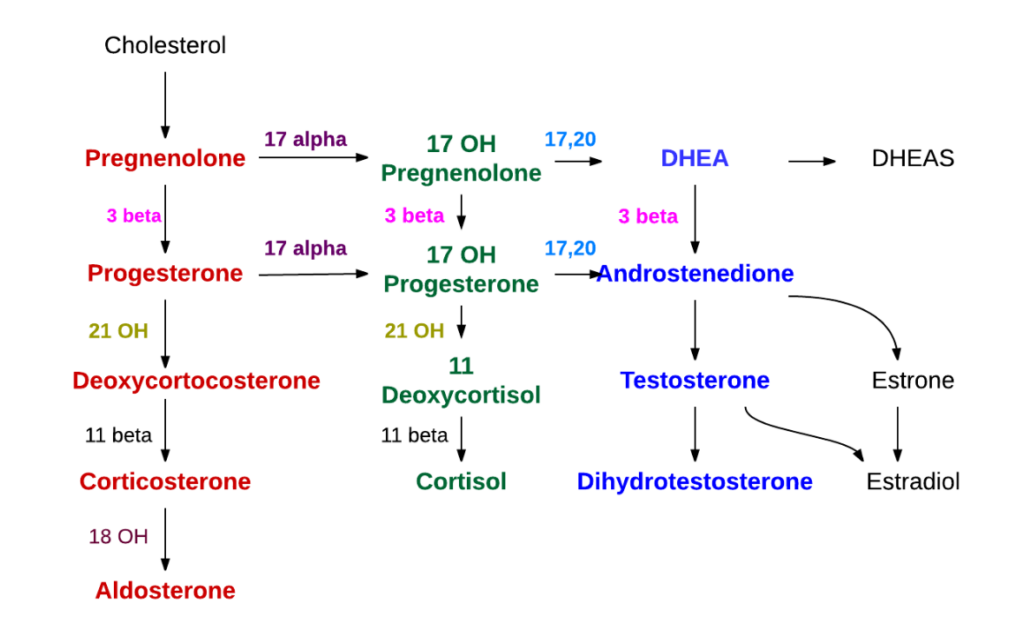
Each of the above pathways of cholesterol breakdown works on the different sections of the adrenal gland.
One can see that the final products of cholesterol leads to increases in aldosterone, cortisol and either dihydrotestosterone or estradiol.
Let’s take a step back for a second. We are talking about stress. The brain keeps producing hormones that cause a spike in our cortisol if we are under constant stress. The more cortisol that our body makes from ACTH, the more aldosterone is also made. Now aldosterone can raise our blood pressure, how, you ask?
Well, here is yet another pathway.
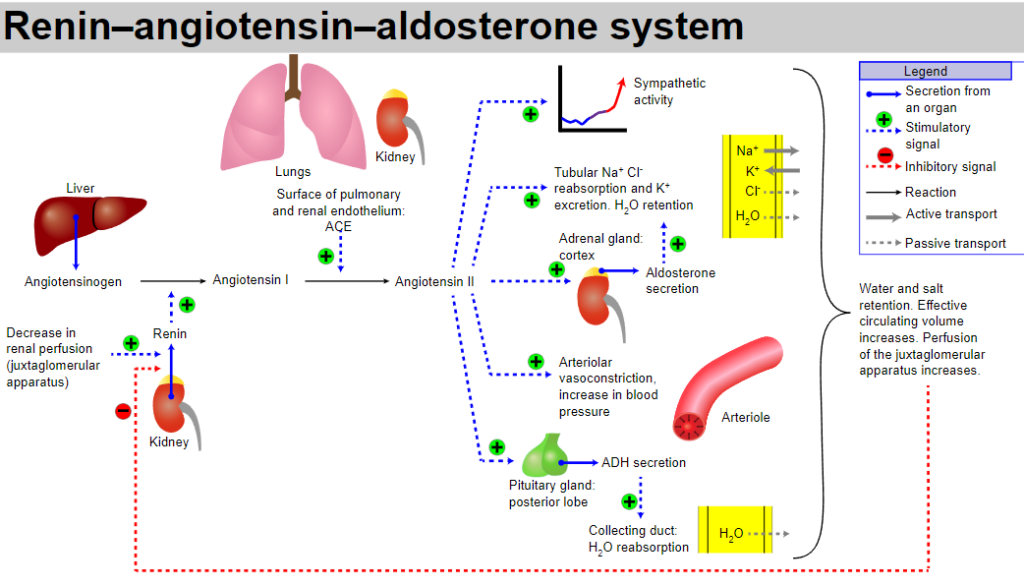
When the body senses aldosterone, a few things begin to happen. An increase in aldosterone causes the kidneys to retain water and salt in the collecting duct. This does not happen to such a high degree as if the body were secreting antidiuretic hormone, but it still occurs in the setting of too much cortisol. You see, when your body is under stress, there is still some ADH that the brain releases as well.
ADH or antidiuretic hormone is released from the neurohypophysis of the adrenal gland through the hypothalamus directly. The pathway that ADH takes is very interesting. First it causes the kidney to secrete renin. Renin will then cause the liver to make angiotensinogen to make angiotensin I. Once this happens, the surface of the pulmonary and renal endothelium will produce ACE or angiotensin conversion enzyme which will cause angiotensin I to go to angiotensin II. Now, once angiotensin II is made, it will then cause an increase in sympathetic activity, renal tubular absorption of salt and water, excretion of K+ and Cl-, more aldosterone secretion, and arteriolar vasoconstriction.
I know that’s a mind freeze. But think about what happens when you are under stress? Your blood pressure goes up, your heart rate goes up and your blood sugar goes up.
So, now can you see what’s happening?
You may ask, why does my blood sugar go up?
Great question!
The two charts below give you an overview of the effects of the benefits of cortisol and the adverse effects of high cortisol.
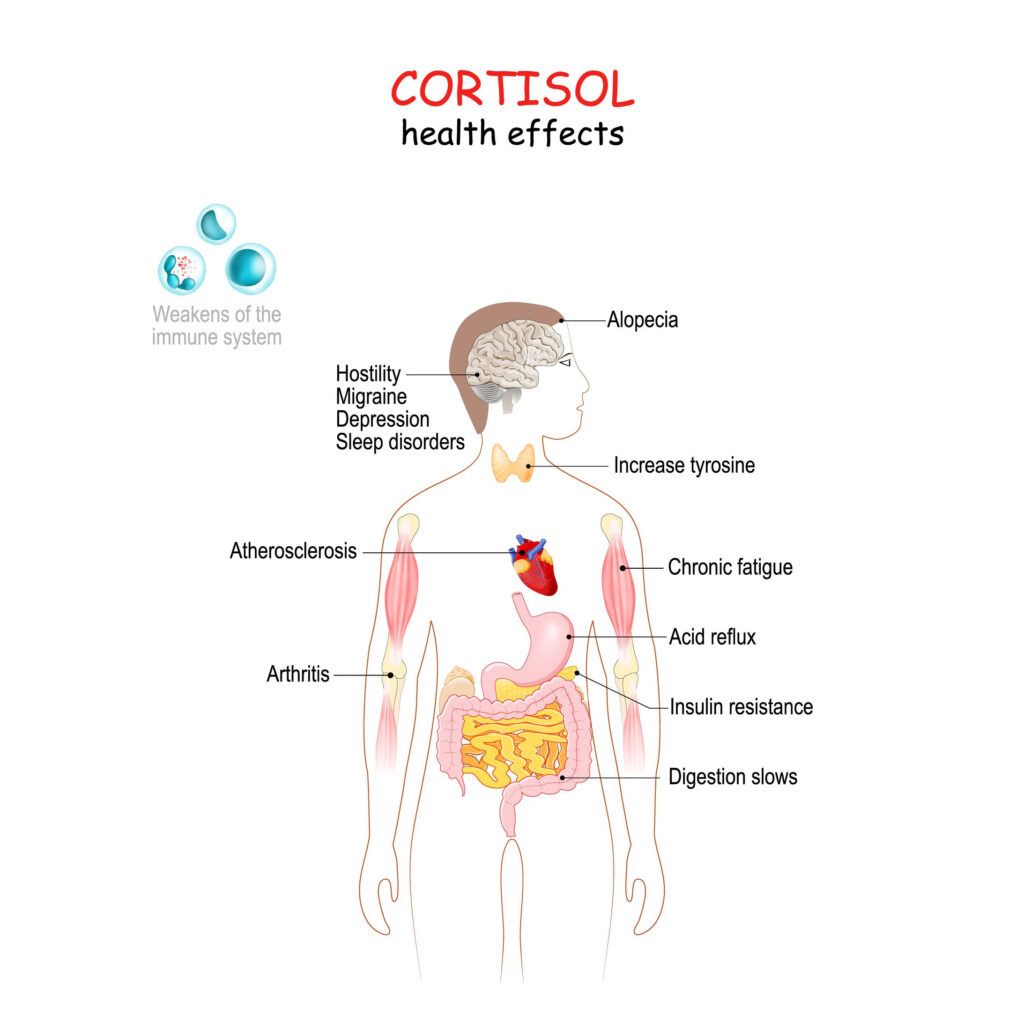
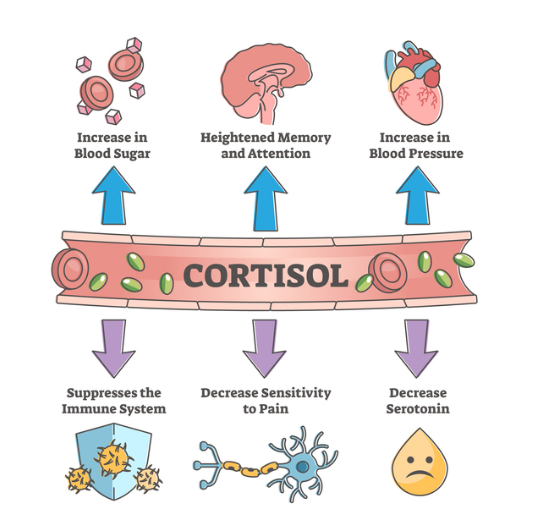
So why does our blood sugar go up? Well, when we are in fight of flight mode, we need that surge of sugar, right? How else can our muscles and brain work together to get us out of a nasty situation? (I know of a few that I have been in!)
However, where daily stress is concerned, it is not fight or flight. Rather, we have put ourselves in a mode where our bodies don’t like the current situation and we just pump out the cortisol. Like popcorn in a popcorn popper. Our bodies don’t’ need it for fight or flight. Therefore, the excess cortisol causes the liver to produce glucose through glycogenolysis or gluconeogenesis and our pancreas becomes less sensitive to high levels of glucose and doesn’t produce insulin as effectively. This is like being in a state of glucose insensitivity, not unlike type II diabetes.
So, you can see the importance of cortisol and the negative effects of too much cortisol. There are certain diseases that can cause an over production of cortisol. Cushing’s disease is one such condition that produces an over abundance of cortisol due to an ACTH secreting pituitary adenoma, although in about 15% of cases it can be caused by a tumor of the adrenal gland. (UCLA Health)
The signs and symptoms of Cushing’s disease are like what happens when we are under a constant state of stress. We get weight gain, poor memory, trouble concentrating, high blood pressure, unwanted hair growth, (in the wrong places if you are a female), and insulin resistance.
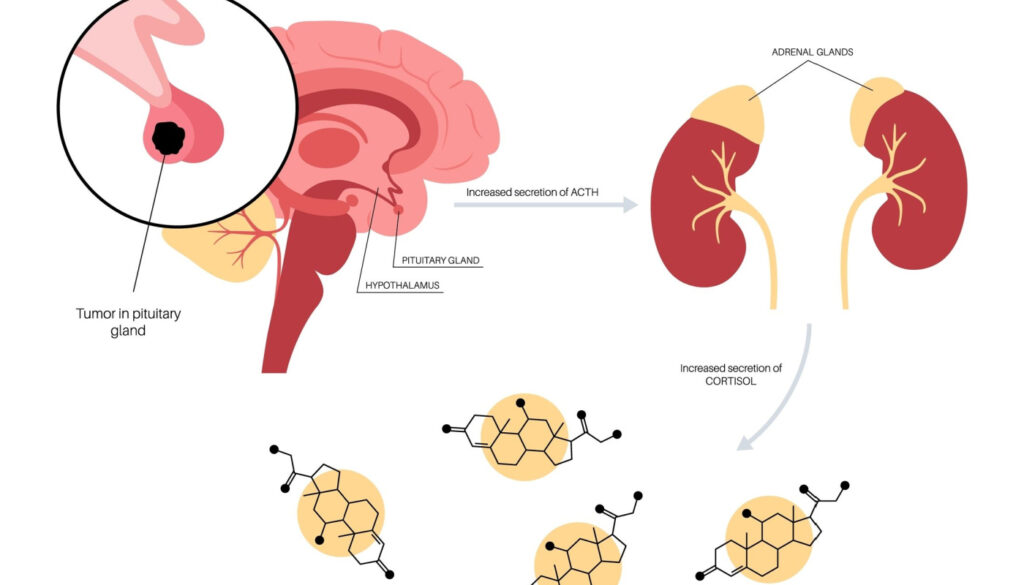
How do you know if you have Cushing’s disease or if you are just under a massive amount of stress? Well, the truth is, sometimes you can’t. Therefore, going to your physician when you start to experience signs and symptoms related to stress and high cortisol would be a good idea. If you are seeing your face start to become shaped like a moon or have abdominal striae and fatigue, then definitely see your doctor. He or She may do a metyrapone test or a dexamethasone suppression test. This metyrapone test blocks the conversion of 11 deoxycortisol to cortisol. The reason that this test is done, is to see if the pituitary gland will secrete ACTH when cortisol levels are low and to see if 11 deoxycortisol will increase. If not, then the negative feedback loop is not working. For instance, in the dexamethasone suppression test, high levels of the synthetic steroid dexamethasone are given to see if the patients ACTH levels decrease. If their levels do not decrease, then there is an ectopic release of cortisol, usually from the adrenal gland. So regardless of the increase in cortisol, if cortisol is still being produced, then it may be adrenal in nature.
There is also the ACTH stimulation test to see if the problem of excess cortisol is caused by the pituitary gland tumor, along with an MRI.
On the flip side of too much cortisol, we have Addison’s disease, which is adrenal insufficiency. But we will cover this in our medical assistant lectures.
Conclusion:
The key points that you should consider are how stress can affect your body and your day-to-day life. Keep in mind that cortisol is necessary and can save your life, while too much can take a toll on your heart, body, and mind. The heart takes a toll from increases in cortisol through increasing blood pressure, triglycerides, cholesterol, and sugar. These can lead to the beginnings of atherosclerosis or hardening of the arteries, which can eventually lead to a heart attack or stroke. (This is also covered in more detail in our Clinical Medical Assistant program)
In recognition of National Stress Awareness month, everyone should take time to evaluate the levels of stress in their lives. While a certain amount of stress is actually beneficial for us, the long-term effects of high stress can be detrimental to our health. Take some time to think about how you can reduce the stress in your life. Try to make time for yourself. Try to see if you can take a short vacation or get a babysitter while you and your significant other do something fun together. Get some exercise or take up a hobby. Find a positive outlet to release some of your stress. You’ll be doing yourself and your loved ones who rely on you a favor.
Best of health!
Students who join our Clinical Medical Assistant Class will learn much more. We have a lot of fun in class. Hope to see you as a student either in class or online:)
Disclaimer: This article is not meant to provide medical advice.
Author: Nancy L Kimmel Registered Nurse, Board Certified Nurse Practitioner, PhD
Author, Nancy Lydia Kimmel is a Registered Nurse and Board Certified Nurse Practitioner, PhD Environmental Engineering/Owner and Founder of Phlebotomy Career Training

References:
UpToDate: https://www.uptodate.com/contents/metyrapone-stimulation-tests
Merck Manual: https://www.merckmanuals.com/professional/endocrine-and-metabolic-disorders/adrenal-disorders/cushing-syndrome#v26441065
Mount Saini: https://www.mountsinai.org/health-library/tests/acth-stimulation-test

Nancy L. Kimmel obtained her PhD in Environmental Engineering in 2002, then went on to teach Physics and Mechanical Engineering at Lawrence Technological University, Henry Ford College and Oakland University. She obtained her Associate in Nursing from Henry Ford College and then went on to earn her Master Degree as a Family Nurse Practitioner and became Board Certified working as a licensed FNP in the State of Michigan. She then went on to Medical School where she is now in her 3rd year, and is also in the process of obtaining her Doctorate in Nursing Practice through Chamberlin University. She has authored the NET Study Guide, as well a several books on subjects of Math, ECG/EKG and Phlebotomy. She holds a patent on an Air Filter through the U.S. Patent Office.


